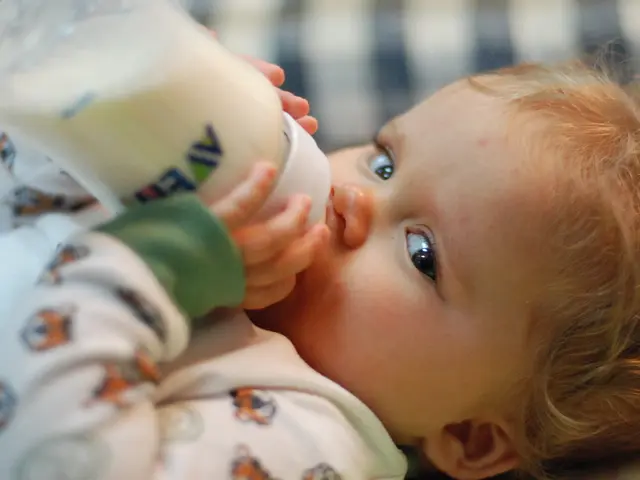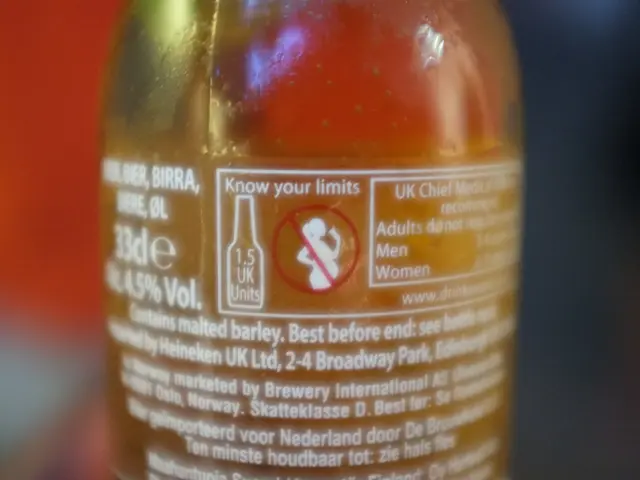Vaccines and Eczema: Addressing Common Questions
Eczema, a group of inflammatory skin conditions, affects millions worldwide. Characterized by severe itching, irritation, and dryness, eczema is often due to an underlying skin barrier dysfunction [1]. This article aims to shed light on why people with eczema, particularly those on immunosuppressive treatments, should be cautious with live vaccines.
The Risks of Live Vaccines for Individuals with Eczema
Treatments for eczema, such as biologics like dupilumab (Dupixent), lebrikizumab, and tralokinumab, can suppress the immune system [3][5]. This immunosuppression makes it risky to have live vaccines, as the weakened immune system may not be able to handle the attenuated pathogens in these vaccines effectively [3][5].
Live vaccines contain weakened but live pathogens, which can cause infections in immunocompromised individuals. For example, if someone with a weakened immune system receives the live attenuated influenza vaccine or the MMR (measles, mumps, and rubella) vaccine, they might develop a more severe infection from the vaccine virus [5].
Vaccines to Avoid for People with Eczema on Immunosuppressive Treatments
Examples of live vaccines to avoid include the MMR vaccine, chickenpox (varicella) vaccine, rotavirus vaccine, and the live attenuated influenza vaccine (LAIV) [5]. It is recommended that individuals with eczema on immunosuppressive treatments receive live vaccinations before starting these treatments. During treatment with biologics, it is generally advised to avoid live vaccines to prevent potential complications [2][3].
In contrast, inactivated vaccines, such as the pneumococcal conjugate vaccine (like Pneu-C20), are generally safe for individuals with eczema who are on immunosuppressive treatments [1]. Examples of non-live vaccines safe for use in eczema include the COVID-19 vaccine, injection influenza vaccine, human papillomavirus (HPV) vaccine, hepatitis B vaccine, whooping cough vaccine, and shingles vaccine.
The Impact of Eczema on Vaccine Response
Eczema does not suppress the immune system, but the risk for infection is increased due to skin barrier dysfunction. This dysfunction causes the skin to lose moisture and increases skin permeability, potentially allowing vaccine ingredients or other allergens to penetrate more deeply and trigger eczema symptoms [1].
Allergies and sensitivities to vaccine ingredients can also cause eczema symptoms to flare. Higher levels of inflammation mean an increase in inflammatory substances, like cytokines, that cause itching and other symptoms [1].
It's essential to note that there is no consistent link between vaccine regimens and atopic dermatitis development, according to a 2021 systematic review and meta-analysis [4]. However, a large-scale 2021 cohort study found that delaying standard diphtheria, tetanus, pertussis, polio, and Haemophilus Influenza type b (DTaP-IPV-Hib) vaccines was associated with a reduced risk for atopic dermatitis after 4 months of age [4].
The Connection Between Eczema and Certain Vaccines
Eczema vaccinatum (EV), a complication caused by the vaccinia virus that makes up the traditional smallpox vaccines, can cause severe eczema symptoms, swollen lymph nodes, and systemic illness [2]. The traditional smallpox vaccine, now reserved for military use and special circumstances, is a live-attenuated vaccine known to cause EV [2].
EV is also associated with the monkeypox vaccine, another vaccine made using the vaccinia virus [2]. Due to the potential for infection, experts do not generally recommend live-attenuated vaccines for people with eczema.
In conclusion, people with eczema, particularly those on immunosuppressive treatments, should be cautious with live vaccines. It is crucial to consult with a healthcare provider to discuss non-live vaccine options and other considerations. By understanding the risks associated with live vaccines, individuals with eczema can make informed decisions about their health and vaccination choices.
- People with eczema, especially those on immunosuppressive treatments, should be cautious about live vaccines due to potential immunosuppression.
- Live vaccines, such as the MMR vaccine, chickenpox vaccine, rotavirus vaccine, and live attenuated influenza vaccine, can cause infections in immunocompromised individuals.
- Inactivated vaccines and non-live vaccines, like the pneumococcal conjugate vaccine, COVID-19 vaccine, hepatitis B vaccine, and shingles vaccine, are generally safe for individuals with eczema.
- Eczema itself does not suppress the immune system, but the risk for infection is increased due to skin barrier dysfunction, which can allow vaccine ingredients to penetrate deeper and trigger eczema symptoms.
- Allergies and sensitivities to vaccine ingredients can also lead to eczema symptoms flaring up.
- Eczema vaccinatum (EV), a complication caused by the vaccinia virus found in traditional smallpox and monkeypox vaccines, can cause severe eczema symptoms, swollen lymph nodes, and systemic illness.
- Consulting a healthcare provider is essential for people with eczema to discuss non-live vaccine options and other considerations regarding vaccinations.




